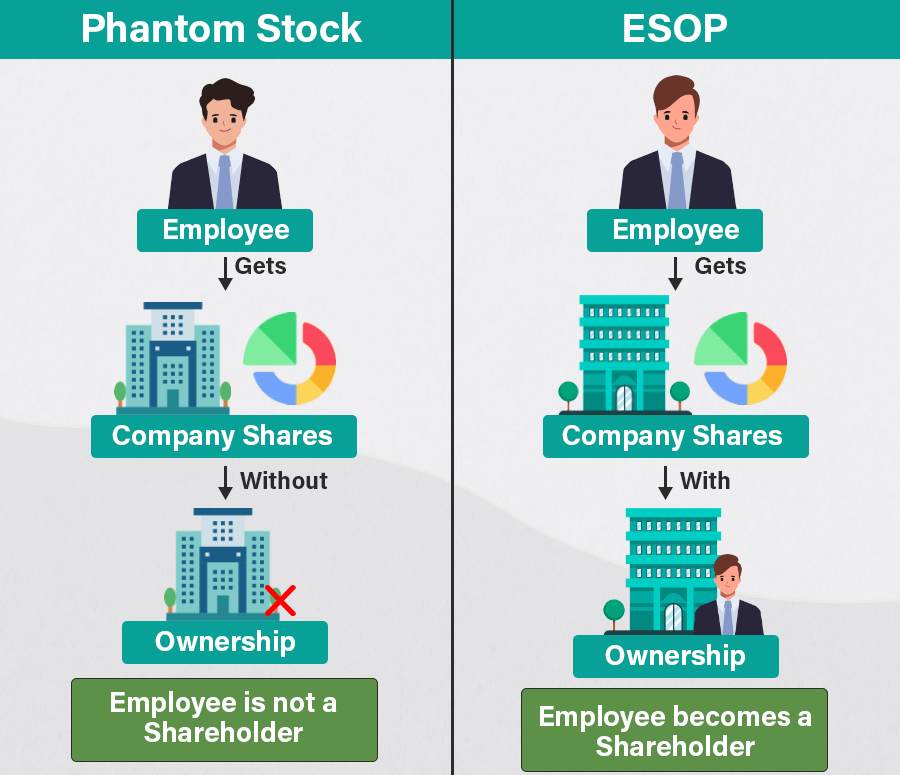Quick Summary
Phantom stock, also known as shadow stock, is a financial incentive mechanism designed for companies—especially those that are privately held—to reward selected employees with the benefits of stock ownership, without the actual transfer of company stock. This approach has been increasingly adopted by various firms aiming to compensate senior management and key employees, thus offering them a stake in the company’s future success without diluting the equity of existing shareholders.
In India, the regulatory landscape for phantom stocks remains largely uncharted, with the concept still relatively novel and formal legal frameworks yet to be fully established. This ambiguity in regulation leaves companies navigating a somewhat grey area when implementing phantom stock plans as part of their compensation strategies.
Taxation of phantom stock in India occurs upon redemption, where employees receive a cash payout. This payout is taxable as perquisites under income from salaries and subject to the prevailing income tax rates applicable to the employee’s total income. Implementing phantom stock plans can align employee interests with company performance, foster loyalty, and avoid equity dilution. However, companies must carefully navigate the legal and tax implications to ensure compliance and maximize benefits.
Blog Content Overview
- 1 What is Phantom Stock?
- 2 Why do Indians companies use phantom stock?
- 3 Types of phantom stocks in India
- 4 How Phantom Stock Works?
- 5 What is a Phantom Stock Agreement?
- 6 Phantom Stock Plan vs Stock Option Plan
- 7 Legal Framework for Phantom Stocks in India
- 8 Tax Implications for Phantom Stocks in India
- 9 Pros and Cons of Phantom Stock
- 10 Conclusion
- 11 Frequently Asked Questions (FAQs) on Phantom Stocks in India
What is Phantom Stock?
Phantom stock, also known as shadow stock, is a financial incentive mechanism designed for companies—especially those that are privately held—to reward selected employees with the benefits of stock ownership, without the actual transfer of company stock. This approach has been increasingly adopted by various firms aiming to compensate senior management and key employees, thus offering them a stake in the company’s future success without diluting the equity of existing shareholders.
By aligning the interests of employees with the goals of the company and its shareholders, phantom stock motivates employees to contribute actively to the company’s success. It works by granting participants “phantom shares” that mimic the performance of the company’s actual stock, thereby allowing employees to enjoy financial rewards parallel to those of shareholders. These rewards are typically doled out in cash or cash equivalents, based on the number of phantom units awarded and the stock’s price at the end of a vesting period.
This innovative compensation strategy not only incentivizes employees by tying their rewards directly to the company’s growth and success but also fosters a strong sense of ownership and dedication towards achieving corporate objectives. With its built-in vesting period, phantom stock encourages a long-term commitment, rewarding employees for their loyalty and contributions towards the company’s enduring success. As a strategic tool for retention and motivation in competitive markets, it presents a flexible solution for companies looking to customize their compensation plans to meet specific corporate goals, while also navigating the unique tax implications associated with such programs.
Why do Indians companies use phantom stock?
Companies in India are increasingly turning to phantom stock plans as a strategic tool for employee compensation, offering significant advantages both for the organization and its workforce.
- Alignment of Interests: Phantom stock plans align employees’ interests with the company’s objectives, motivating them to work harder for the collective success of the organization.
- Employee Loyalty: By feeling financially invested in the company’s future, employees are likely to develop a sense of loyalty, increasing their tenure with the firm to maximize their compensation through phantom stock.
- Avoidance of Share Dilution: Companies opt for phantom stock plans when they wish to incentivize employees without issuing additional shares, thus avoiding dilution of existing shareholders’ equity.
- Legal Flexibility: Phantom stock provides a viable alternative in situations where legal constraints might limit the issuance of actual equity to employees.
- Merit-based Compensation: The allocation of phantom shares can be based on an employee’s role, seniority, and performance, promoting a culture of meritocracy within the organization.
- Long-term Incentives: With payouts often scheduled over a period of years and possibly contingent upon reaching certain milestones, phantom stock plans incentivize long-term commitment and contribution to the company’s goals.
Types of phantom stocks in India
In the dynamic startup landscape, attracting and retaining top talent is crucial. To address this challenge, companies are increasingly turning to innovative compensation structures. Among these, phantom stock plans are gaining significant traction due to their versatility. This flexibility allows companies to design plans that cater to their specific needs, each with distinct mechanisms and advantages.
- Full Value Phantom Stock Plans: Under this type, employees receive the full value of the stock at the time of payout, reflecting the stock’s appreciation from the grant date. For instance, if an employee receives phantom units corresponding to 100 shares at a grant price of ₹100 per share, and the stock price climbs to ₹150 per share at vesting, the employee would be entitled to a cash payout of ₹5,000 (₹150 – ₹100) multiplied by 100 units.
- Appreciation Only Phantom Stock Plans: This type of plan focuses solely on the appreciation in the stock price, not the full value at the time of grant. Employees benefit solely from the increase in the stock price upon vesting. This structure proves advantageous for startups seeking to reward employees for their contribution to the company’s growth trajectory, while mitigating the initial financial burden associated with issuing full-value stock options.
How Phantom Stock Works?
Phantom stock plans offer a unique way for employees to gain the financial benefits of stock ownership without holding actual shares in the company. Through a formal agreement, employees are granted phantom stock units that mirror the performance of the company’s real stock. As the company’s stock value increases, so does the value of the phantom shares.
The key difference between phantom stock and traditional stock options lies in the nature of ownership and compensation. While stock options may lead to actual equity ownership upon exercise, phantom stock always results in cash compensation, without transferring any company shares to the employees. This mechanism benefits both the company, by avoiding equity dilution, and the employee, by offering a simplified and direct financial reward tied to the company’s performance.
- Granting Units: Employees are awarded a specific number of phantom units. These units don’t translate to ownership rights in the company.
- Vesting Schedule: A vesting schedule dictates when employees gain the right to receive the phantom stock payout. This period can range from a few years to the entirety of their employment.
- Performance Metric: The most common performance measure is the stock price appreciation. Some plans might consider other factors like company profitability.
- Payout Calculation: Upon vesting, the employee receives a cash payment based on the predetermined number of units multiplied by the difference between the grant price (stock price at the time of grant) and the exercise price (stock price at the time of vesting).


What is a Phantom Stock Agreement?
A phantom stock agreement is a legal contract between an employer and employee, allowing the latter to benefit from stock ownership perks without holding actual company shares. The agreement details how phantom shares track the company’s stock price and the process for calculating payouts. Importantly, these payouts don’t affect shareholder equity. This document acts as a guide for its execution and administration. Employees receive artificial shares that track the actual stock’s price movements, providing payouts from profits without affecting shareholder equity.
Phantom stock agreements are crucial for outlining plan terms and dispute resolution, ensuring a smooth experience for both companies and employees. These agreements act as a safety net, protecting both parties’ interests while adhering to best practices.
- Clarity and Transparency: The agreement ensures clarity and transparency for both parties. Employees understand the conditions for earning a payout, and companies have a legal framework for managing the plan.
- Dispute Resolution: A well-drafted agreement addresses potential issues and outlines dispute resolution mechanisms in case of disagreements.
- Compliance with Regulations: Although India doesn’t have specific regulations governing phantom stock plans, the agreement ensures compliance with broad company and tax related laws and best practices.
- Protection for Both Parties: The agreement defines expectations and safeguards the interests of both the company (financial management) and employees (benefit clarity).
Phantom Stock Plan vs Stock Option Plan
| Feature | Phantom Stock Plan | Stock Option Plan (ESOP) |
| Ownership | Employee doesn’t own actual shares | Employee becomes a shareholder |
| Payout | Cash based on stock price appreciation | Owns company stock (potential for capital gains) |
| Cost to Employee | No upfront cost | May require exercise price payment |
| Company Cost | Cash payout at vesting/exit event | Lower upfront cost, potential dilution later |
| Risk for Employee | Lower – only benefits from appreciation | Higher – risk of stock price decline |
| Risk for Company | Higher – obligated to cash payout | Lower – no upfront cost, dilution risk |
| Focus | Aligns interests with company growth | Provides ownership & potential capital gains |
| Regulation (India) | No specific regulations | Governed by Companies Act & SEBI rules |
| Tax Implications | Yes, for both company & employee | Yes, for both company & employee |
Legal Framework for Phantom Stocks in India
In India, the regulatory landscape for phantom stocks remains largely uncharted, with the concept still relatively novel and formal legal frameworks yet to be fully established. This ambiguity in regulation leaves companies navigating a somewhat grey area when implementing phantom stock plans as part of their compensation strategies.
- The Companies Act of 2013, a cornerstone of corporate law in India, does not explicitly address phantom stocks, focusing instead on the rules and regulations governing the issuance of stock options. This silence leaves a gap in the legal framework for companies looking to offer phantom stocks, a mechanism that allows employees to benefit from the appreciation of the company’s stock without actually owning the shares.
- SEBI (Securities and Exchange Board of India), the regulatory authority overseeing securities and commodity markets in India, offers guidance primarily to listed companies through its regulations. These rules, in conjunction with the Companies Act, provide a structure for issuing employee stock options and equity-settled SARs but stop short of covering non-equity financial incentives like phantom stocks for unlisted companies and startups.
However, an instance of informal guidance by SEBI in 2015 sheds some light on the regulatory stance towards phantom stocks. When Mindtree Limited sought clarification on SARs and Phantom Stock, SEBI indicated that its regulations would apply to an employee benefit scheme involving any form of securities dealing, subscription, or purchase, directly or indirectly. Since Mindtree’s phantom stock plan was based on cash payments reflecting share price appreciation without involving actual share transactions, SEBI’s regulations were deemed not applicable.
Tax Implications for Phantom Stocks in India
Navigating the tax implications of phantom stocks in India requires a nuanced understanding of the income tax landscape, particularly as it pertains to employee compensation. Phantom stocks present a unique case for taxation, distinguished by three pivotal events: the issuance, the fulfillment of conditions (vesting), and the redemption of the phantom stock.
- Issuance of Phantom Stock: At the moment phantom stocks are issued to employees, they acquire merely the right to receive a future payment, contingent upon specific conditions being met. At the time of issuance and vesting, employees don’t incur any immediate tax liability. These stages establish the right to a future benefit but don’t involve actual income realization.
- Vesting of Phantom Stock: As the conditions preset in the phantom stock plan are fulfilled over time, the employee’s right to the future payment is reaffirmed. However, similar to the issuance phase, the vesting event does not initiate a tax event for the employee. The vesting merely solidifies the employee’s claim to future payment under the plan, without any real-time financial transaction or income realization occurring.
- Redemption of Phantom Stock: The taxation dynamics shift significantly upon the redemption of phantom stock. It is at this juncture that the employee receives a cash payout, either reflecting the full value of the stock or the appreciation in stock value, depending on the plan’s structure. This payout is taxable in the hands of the employee as perquisites, falling under the income from salaries category. This is the point at which the tax implications come into full effect, with the amount received being subject to the prevailing income tax rates applicable to the employee’s total income. The taxation dynamics shift upon redemption, when employees receive a cash payout. This payout is taxable as perquisites under income from salaries and subject to the prevailing income tax rates applicable to the employee’s total income.
For employers, the primary tax obligation concerns deducting TDS (Tax Deducted at Source) at the applicable rates on payouts, following income from salaries provisions. Beyond this, there are no specific tax liabilities imposed on the company in relation to the phantom stock payouts.
Pros and Cons of Phantom Stock
Phantom stock can be a tempting incentive, but it’s important to understand both the potential rewards and drawbacks before diving in.
Pros:
- Broad Applicability: Phantom stock works for both public and private companies, offering greater flexibility than traditional stock options.
- Alignment with Growth: The rewards arising out of phantom stocks directly tied to the company’s success, incentivizing the employee to contribute to its company’s growth.
- No Dilution: Phantom stock doesn’t affect the company’s ownership structure, unlike traditional options.
Cons:
- Performance-Dependent: The benefit is directly dependent on the increased performance, hence the cumulative growth of a company as an organization is necessary for an individual to receive benefits such as phantom stocks.
- No Ownership Rights: Employees don’t become shareholders and don’t receive voting rights or dividends associated with actual stock ownership.
- Cash Flow Concerns: Cash-strapped startups may struggle to meet payout obligations in the future.
Conclusion
In conclusion, phantom stock represents a strategic and flexible compensation tool within the Indian corporate landscape, offering companies a novel way to align employees’ interests with organizational growth without diluting equity. While the regulatory framework remains underdeveloped, the concept has gained traction among Indian companies, from startups to established corporations, due to its ability to incentivize key employees effectively. The tax implications and legal nuances of phantom stock require careful navigation, but the benefits, including enhanced employee loyalty and performance, make it an increasingly popular choice. As the Indian market evolves, it’s likely that we’ll see a more defined regulatory and legal framework emerge, further solidifying phantom stock’s role in the broader compensation strategy of Indian businesses.
Frequently Asked Questions (FAQs) on Phantom Stocks in India
Q: What are Phantom Stocks in India?
A: Phantom stocks, also known as shadow stock, are a form of equity incentive plan. They offer employees a cash payment based on the company’s stock price performance without granting actual ownership of shares. Think of them as mimicking real stocks, but with cash settlements.
Q: How do Phantom Stock Units (PSU) work in India?
A: Companies grant PSUs to employees, specifying a number of units and a vesting period. These units are linked to the company’s stock price. Upon vesting, employees receive a cash payout equal to the appreciation (increase) in the stock price multiplied by the number of PSUs.
Q: What are the tax implications of Phantom Stocks in India?
A: The cash payout received from vested PSUs is considered income and taxed accordingly. The company can claim a tax deduction for the cash paid out to employees. It’s advisable to consult a tax advisor for specific details.
Q: Are Phantom Stocks beneficial for employees in India?
A: Yes, phantom stocks can be attractive for employees. They offer a chance to benefit from the company’s growth without the risks associated with owning stock directly. However, they don’t grant voting rights or dividends like actual shares.
Q: Are Phantom Stocks the same as Stock Options in India?
A: No, phantom stocks and stock options are different. Stock options grant the right to buy company shares at a predetermined price within a specific timeframe. With phantom stocks, employees receive cash based on stock price performance, not ownership.
Q: How are Phantom Stocks valued in India?
A: The value of a PSU is determined by multiplying the number of units by the difference between the grant price (stock price when PSUs were issued) and the fair market value of the company’s stock on the vesting date.
Q: What are the accounting standards for Phantom Stocks in India?
A: Indian Accounting Standards (Ind AS) don’t have specific guidelines for phantom stocks. However, companies typically follow Ind AS 102 (“Share Based Payment”) for accounting purposes.
Q: What are the legal considerations for issuing Phantom Stocks in India?
A: Companies should have a formal Phantom Stock Plan policy/agreement outlining terms, conditions, and employee eligibility for issuing Phantom Stocks in India.
We Are Problem Solvers. And Take Accountability.
Related Posts


Compliance Calendar – July 2025 (Checklist & Deadlines)
Sync with Google CalendarSync with Apple Calendar As we enter the second half of 2025, staying compliant with various financial,...
Learn More

Conversion of Partnership Firm to LLP – Step by Step Process
For many entrepreneurs in India, a partnership firm serves as the foundational legal structure for their business ventures. However, as...
Learn More

Memorandum of Association – MoA Clauses, Format & Types
The Memorandum of Association (MOA) is one of the most essential documents in the company incorporation process, forming the foundation...
Learn More












